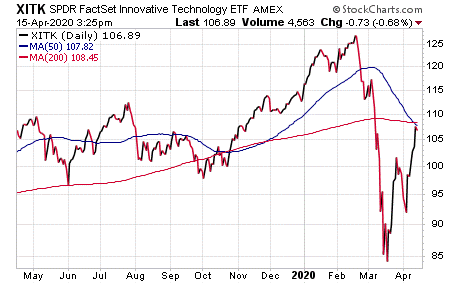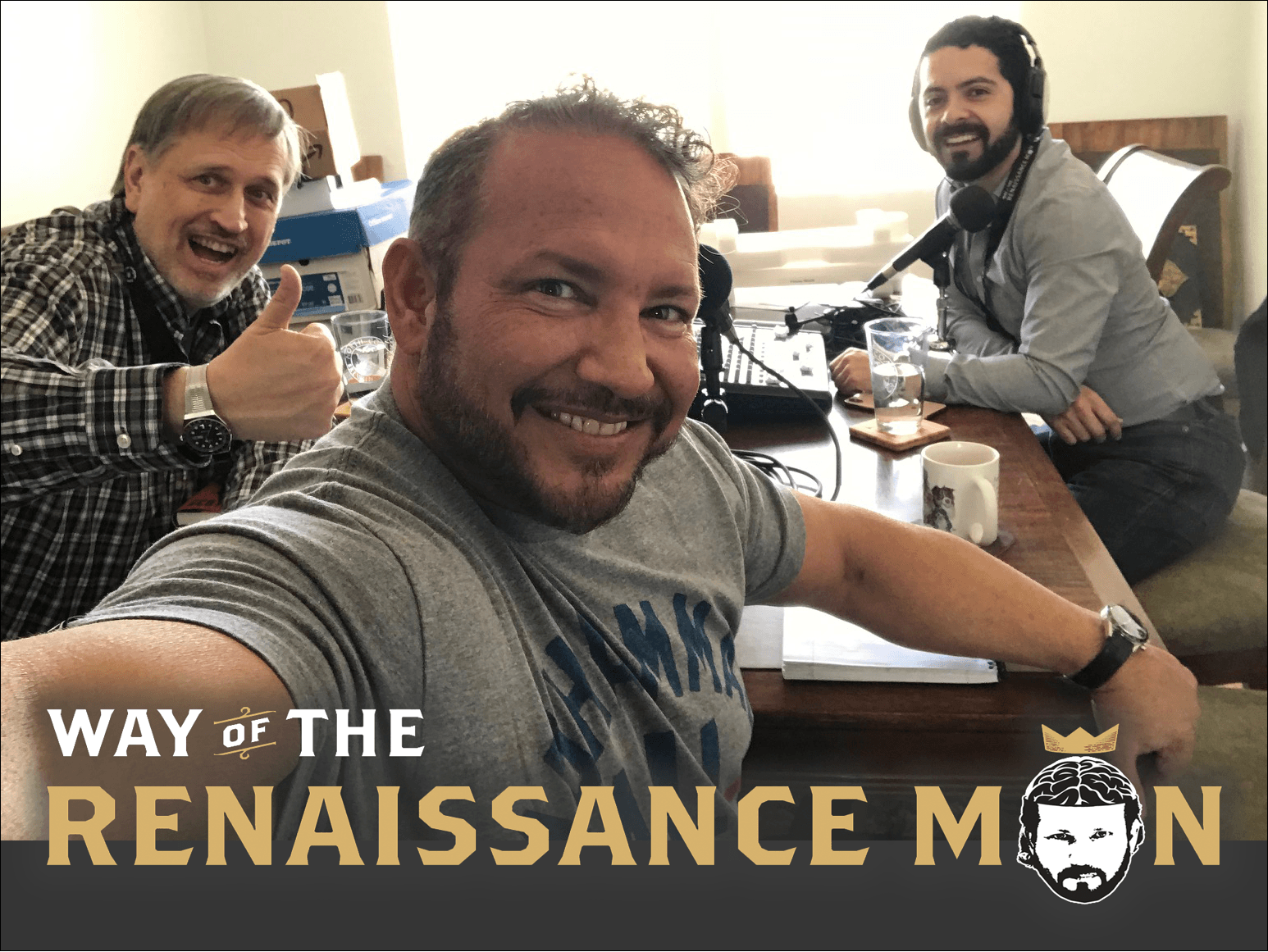The Other Side of the Coronavirus
- The Other Side of the Coronavirus
- ETF Talk: This ‘Stay-At-Home’ Tech Fund Offers Targeted Exposure
- What Makes A Renaissance Man Tick?
- In Praise of the N95 Hero
- Aristotelian Courage
Every time I turn around
The man tries to get me down
I just can’t see your face
I’m blinded by the sun, living on the run
And I can’t remember this place
Won’t ya take me to the other side…
–Ryan Bingham, “The Other Side”
I went to the store on Saturday. I was wearing a N95 mask and nitrile gloves.
Now, the only thing unusual about that is that everybody else in the store was wearing a mask and gloves. Such is the state of COVID-19 America, where personal protective gear isn’t just for the medical professionals at hospitals — it’s for the average Joe who’s going to the local Trader Joe’s.
Why did I wear the mask and gloves? Did I wear them because the governor of my beloved Golden State of California told me to do it? Did I wear them because the ubiquitous voice of viral authority Dr. Anthony Fauci said I should? Did I wear them because President Trump offered me the option to do so?
No. I wore them because I want to stay alive and because life is the standard of value for a rational man. Without life, no other values are possible.
Do I like social distancing? No, I hate it.
I love people, and I love going to concerts, restaurants, the gym, the pub, the coffee house, the shooting range, rodeos and other sporting events (my beloved Long Beach Grand Prix was supposed to be this weekend). Yet, I love my life more, and I know that if I get sick, or if those who I value most get sick and suffer devastating consequences, I won’t get to enjoy these things.
So, for now, I am abiding by the rational policy of staying at home, practicing social distancing and wearing protective gear whenever I simply have to leave my residence.
Of course, the other side of this coronavirus damage is economic, and we’ve already seen the beginnings of the devastation headed our way.
Massive job losses, massive government bailouts, massive injections of capital via asset purchases by the Federal Reserve, massive new debt and an even more massive collapse in gross domestic product (GDP) are expected to be the short-term result of this virtual lockdown on economic activity.
Yet, how long can we sustain this economic hit before we start to kill the livelihoods of Americans permanently?
This is the debate that is raging right now in Washington, D.C., and throughout the 50 state capitals. More specifically, the debate now has become all about whether President Trump has the authority to “open up” the economy, or whether lifting lockdown orders and school closures is in the hands of the states.
However, do the politicians really control when the shutdown ends? Or, is it you and I, the American citizens, who will decide?
As Ira Stoll writes at Reason.com, “In the fight between the governors and President Trump over who has the authority to reopen America, the politicians have it wrong. It’s not the politicians who have the power to reopen America, or at least the parts that are now closed. It’s individuals, families, businesses and religious congregations.”
I agree with this analysis, and the reason why is because no politician has ordered me to take the proper actions to ensure my safety. I made that decision based on my own rational judgment. And, when we all get back to business, it won’t be because President Trump, or Gov. Gavin Newsom or Gov. Andrew Cuomo say so.
Or as Stoll puts it, “…when America reopens, it won’t be the response to top-down orders from politicians. That’s not how America works, not how the world works. If the president or governor says ‘open’ and hospitals and funeral homes are clogged with COVID-19 critical cases and fatalities, plenty of people are going to remain in place based on the assessment that it’s not worth risking death to comply with some politician’s restart timeline.”
So, it’s the rational judgment of individual Americans that’s really going to determine when this crisis is over, and when the economy will begin to heal.
And why is that? What is the motivation for that return to normalcy? I’ll leave you with how Stoll so eloquently puts it:
“Children want to see their parents. Parents want to see their children. Grandparents want to see their grandchildren. People who haven’t yet started families want to go on in-person dates. Business owners want to make money.”
Rational self-interest is the true motivating force here, and it’s one that’s not dictated to us from the White House or from a governor’s mansion.
P.S. Did you sell your stocks at the right time, i.e., before the selling storm began? Subscribers to my Successful Investing advisory service sold our equity holdings in late-February, way before the worst of the carnage took place.
If you want to make sure you have this “Fail-Safe” plan in place to protect and grow your money, then I invite you to check out Successful Investing today.
**************************************************************
ETF Talk: This ‘Stay-At-Home’ Tech Fund Offers Targeted Exposure
(Note: Today’s ETF Talk is the first in a series of funds designed to profit from the “stay-at-home” trend in COVID-19 America.)
There is an emerging trend of relatively new exchange-traded funds (ETFs) that are looking to capitalize on specific investment ideas targeting growth companies with strong potential.
One of these funds, launched in 2016, is the SPDR FactSet Innovative Technology ETF (XITK). The strategy of this fund is to invest in technology and electronic media companies that are considered innovative or disruptive.
Companies can be considered “innovative” if they belong to technology subsectors with top revenue growth characteristics. This is a relatively high-risk type of investment, as growth-oriented tech companies are often prone to fluctuations in value.
XITK’s performance has been volatile. Since it launched, it was up about 160% over four years prior to the coronavirus-induced meltdown in the market starting in February. Now, the fund’s 12-month performance clocks in at around zero, while it is still up 118% since inception.
Assets under management are low at just under $57 million. While this means the fund falls below my recommended threshold for investment, its strategy is an interesting one worth bringing to your attention. The expense ratio of 0.45% is not too high compared to other funds of this general nature. The fund has a tiny 0.15% yield.

Chart courtesy of StockCharts.com
XITK’s holdings are primarily based in the software and information technology subsector. However, other sectors are represented, such as semiconductor makers and media companies. Although the fund strives to equally weight its 99 holdings, in the short term, allocation percentages can change due to increases or decreases in asset value until the fund rebalances itself.
Accordingly, its largest position is currently Zoom Video Communications (NASDAQ:ZM), which has rocketed upward due to increased usage during the COVID-19 outbreak.
For investors seeking innovative solutions for their portfolios and a chance to invest in a basket of growth-oriented companies that are positioned to benefit from the “stay-at-home” trend, the SPDR FactSet Innovative Technology ETF (XITK) could be worth considering as an investment or a good source for stock ideas.
As always, I am happy to answer any of your questions about ETFs, so do not hesitate to send me an email. You just may see your question answered in a future ETF Talk.
********************************************************************
What Makes A Renaissance Man Tick?
At the risk of sounding embarrassingly self-serving, I’ll first let you know that many readers and listeners to my podcast have asked me how I came to be called “The Renaissance Man.”
Well, it’s a nickname that was given to me by my friends in college, and ever since then, the moniker has just stuck. But what is a Renaissance Man, how does one become a Renaissance Man and what is it that makes a Renaissance Man “tick”?
In the new episode of the Way of the Renaissance Man podcast, the tables get turned, as I go from interviewer to interviewee, courtesy of my friends and “Position To Win” authors John Paul Mendocha and Gabe Bautista.

In this revealing interview, I talk about my educational and professional background, and how my experiences have shaped my approach to life. I also tell you why I love doing so many different things.
Most importantly, you’ll discover why the key to becoming a Renaissance Man is to focus on the ideas you love and then integrate those ideas into action. The combination of focus and integration is what allows one to celebrate those integrated ideas in action.
If you’ve ever wanted to find out what makes a Renaissance Man tick, then this special reprise interview from the “Position To Win” podcast is what you’ve been looking for.
********************************************************************
In case you missed it…
In Praise of the N95 Hero
If you saw a true hero, would you know it?
You might know it if you were on the beaches of Normandy, France on June 6, 1944. You might also know it if you were in the fields of Gettysburg, Pennsylvania on July 1, 1863. And you would indeed know it if you were aboard United Flight 93 on Sept. 11, 2001.
Yet today, during the most pernicious viral pandemic in more than a century, there is one relatively easy way to know if you’ve seen a true hero — because he/she is likely to be wearing a N95 respirator mask.
In addition to that N95 mask, you’ll also find that hero wearing latex gloves, a full-body disposable gown, a face shield and other forms of personal protective equipment (PPE).
You see, today, in this fight against COVID-19 (“CO” stands for corona, “VI” for virus, and “D” for disease, identified in “19” or 2019), the real hero on the front lines of this battle is the doctor, nurse, hospital worker, first responder, medical researcher or other health care professional risking his/her own safety to take care of the victims of this microscopic menace.
Now, I know I am not the first observer to feel a combination of awe, sympathy, gratitude and inspiration at the work these heroes are doing. Recent op-eds in the Wall Street Journal, Washington Post and CNN.com all have done a beautiful job of chronicling the heroism of the N95 hero.
In his Wall Street Journal op-ed, “Nurses Are the Coronavirus Heroes,” Paul Dohrenwend writes about nurses in the following way:
“The nurses marinate in risk as they spend the greatest amount of time with the patient. They draw blood, obtain samples, provide oxygen, and steadfastly tend to their patients’ needs. They are by the doctors’ side as we intubate patients struggling to breathe. Once that patient is transferred to the intensive-care unit, it’s the nurses who do the mundane and the heroic to make sure the patient survives the illness or dies more comfortably.”
I don’t know about you, but to “marinate in risk” is not how I want to spend my day.
In the Washington Post, “These are the heroes of the coronavirus pandemic,” Deputy editorial page editor Ruth Marcus muses:
“There is some danger inherent in the ordinary practice of medicine, but not this much. I confess: I do not know that I would do the same in their circumstances; I am not sure I am so generous or so brave. If my child were graduating from medical school, how would I deal with her being sent, inadequately protected, into an emergency room? If my husband were a physician, would I send him off to the hospital — or let him back into the house in the interim?”

Photo courtesy of Shutterstock
And at CNN.com, “The real heroes in the fight against coronavirus,” Thomas Lake writes:
“Someday, when all this is over, we’ll likely put up statues of people in hospital scrubs. We’ll have parades in their honor. Their names will go on bridges, highways and memorial walls. Maybe they’ll get their own national holiday. Right now, though, our nurses and doctors are busy fighting for our lives. Some of them are dying.”
Of course, not all heroes in this battle wear N95 masks. There also are heroes of the sort that Elan Journo writes about in the New Ideal in his piece, “Unsung Heroes of the Pandemic: Creators of Our Digital Age.”
Journo has much praise for the N95 hero, whom he has previously called “under-appreciated heroes.” But he also identifies another hero helping society survive through this pandemic:
“Reflecting on this crisis, I’ve come to have a deeper appreciation for another group of heroic individuals. We rely on their tireless work and achievements every day, but more so as millions of us are subjected to stay-at-home orders. But they are unsung. Call them the builders of our digital age. Thanks to them, the lockdowns are more tolerable than they otherwise would have been.”
Journo then goes on to praise the creators of products such as Gmail, Dropbox, Slack, Microsoft Teams, Zoom, Netflix and YouTube and Disney+, Hulu, Spotify, Apple Music, Amazon and Instacart for making it possible for us all to stay safe and sane while under virtual home quarantine.
Yet, as much respect, admiration and praise as these creators deserve, there is something extra valorous about someone who dons the N95 mask and engages in hand-to-hand combat with this viral predator.
At this time, for this effort, and for this heroism, I am reminded of what Shakespeare wrote in “Henry V” in the epic speech known as “This day is called the feast of Crispian.”
Here are the final lines of this rousing and inspirational speech, which is perhaps the best motivational passage ever written:
From this day to the ending of the world,
But we in it shall be remember’d;
We few, we happy few, we band of brothers;
For he to-day that sheds his blood with me
Shall be my brother; be he ne’er so vile,
This day shall gentle his condition:
And gentlemen in England now a-bed
Shall think themselves accursed they were not here,
And hold their manhoods cheap whiles any speaks
That fought with us upon Saint Crispin’s day.
So today, I want to praise the few, the happy few, the band of brothers, these N95 heroes, who shed their blood with each other in the fight against COVID-19.
May the rest of us who are not on the front lines strive to replicate their valor.
*********************************************************************
Aristotelian Courage
“You will never do anything in this world without courage. It is the greatest quality of the mind next to honor.”
–Aristotle
The ancient Greek thinkers knew that life on earth is what mattered. That’s why Greek philosophy is so human-centric and so concerned with how to live the rational life. In this quote, Aristotle reminds us of one of the greatest attributes a human can possess — courage. Aristotle died in 322 B.C., but his words have never been truer, or more important, than they are right now.
Wisdom about money, investing and life can be found anywhere. If you have a good quote that you’d like me to share with your fellow readers, send it to me, along with any comments, questions and suggestions you have about my newsletters, seminars or anything else. Click here to ask Jim.
In the name of the best within us,

Jim Woods


